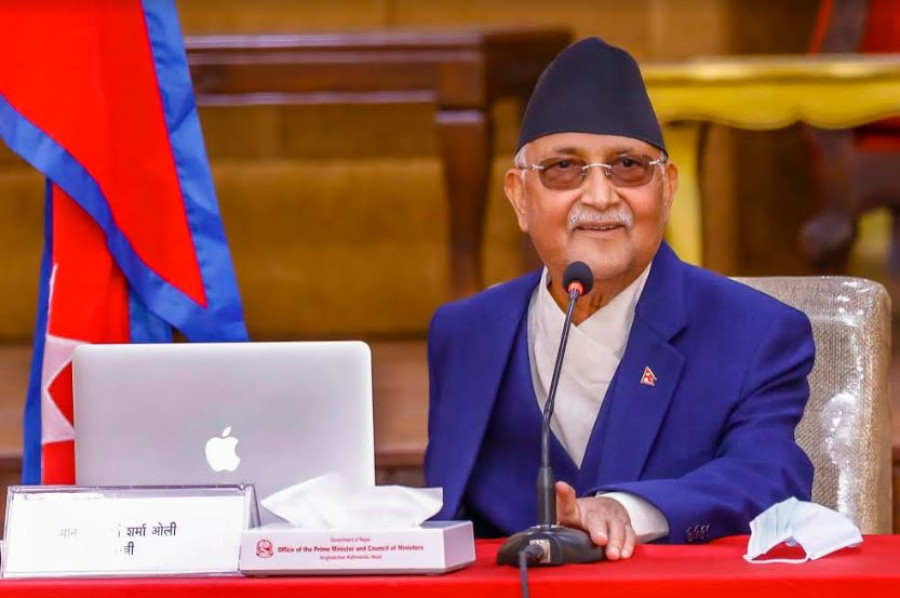Politics
Cabinet decides to recommend repealment of two ordinances that were promulgated on Monday
The Oli government backtracks on ordinance decisions after widespread criticism, including from within the ruling party.
Tika R Pradhan & Binod Ghimire
The KP Sharma Oli government has backtracked on its Monday’s decision of recommending two ordinances, which were promulgated almost immediately by the President.
A minister told the Post that Friday’s Cabinet meeting decided to recommend repealment of the ordinances to the President.
“The Cabinet decided to repeal the ordinances following excessive criticism from everywhere,” said Energy Minister Barsaman Pun. “The government has already sent its decision to the Office of the President.”
Oli’s decision to introduce the two ordinances—one related to political parties and another related to the Constitutional Council—had drawn widespread criticism from within his own party as well as others, including opposition and experts.
On Thursday, during a meeting with Oli, Pushpa Kamal Dahal, the other chair of the Nepal Communist Party, had suggested that the government withdraw the ordinances. During a Secretariat meeting, also held on Thursday, majority of members had opposed the government move of issuing the ordinances.
Likewise, a meeting of six of the nine Secretariat members held at party Vice-chairman Bamdev Gautam’s residence decided to take up the issue with the Standing Committee.
After pressure from the party, the prime minister had made up his mind to roll back the ordinances on Thursday itself.
There, however, was confusion over the process and the prime minister had held several rounds of talks with legal experts as well.
The government can recommend ordinances as per Article 114 (1) of the constitution.
Article 114 (1) states that if, at any time, except when both Houses of the Federal Parliament are in session, circumstances exist which render it necessary to take immediate action, the President may, on recommendation of the Council of Ministers, promulgate an Ordinance.
Article (2) (b), however, states that an ordinance promulgated under clause (1) may be repealed at any time by the President.
Purna Man Shakya, an expert on constitutional affairs who teaches law at Nepal Law Campus, told the Post on Thursday the government had two options if it wanted to backtrack on its earlier move.
“It can either recommend a repealment or replace the ordinances through the new ones. “But for the replacement, a new draft needs to be prepared and endorsed by the Cabinet,” said Shakya.
Rather than the process, the decision had hurt the Oli government’s image as the two ordinances were introduced at a time when the focus should have been on the fight against Covid-19.
The ordinance related to political parties eases the provision for party split and registration of a new party, while the one related to the Constitutional Council eases appointment of office bearers in the constitutional bodies.
The move was viewed as Oli’s intention to concentratate power.
“Issuing the ordinances was a thoughtless move by the Oli government. The sooner he decides to repeal them, the better it is for his image,” Bipin Adhikari, a former dean of Kathmandu University School of Law, told the Post on Thursday.
According to him, both the ordinances were issued with mala fide intentions.
The promulgation of the ordinance related to political parties had an immediate impact on national politics. After around seven lawmakers from the Samajbadi Party planned a party split, the party leadership reached a hurried decision to unify with the Rastriya Janata Party Nepal.
An amendment to the Political Party Act through the ordinance meant 40 percent of members of the central committee or parliamentary party can register a new party.
The dissenting lawmakers later dropped the plan to register a new party Samajbadi Party and Janata Party on Thursday morning applied for a new unified party–Janata Samajbadi Party.
An amendment to the Constitutional Council (Duties, Functions and Procedures) Act meant three of the six members could take a decision on appointments in the second meeting if the first meeting failed to find unanimity.
Experts on constitutional affairs said the Oli government had challenged the constitution by introducing the ordinance related to the Constitutional Council.
“It contradicted the spirit of the constitution,” said Adhikari.




 19.6°C Kathmandu
19.6°C Kathmandu















